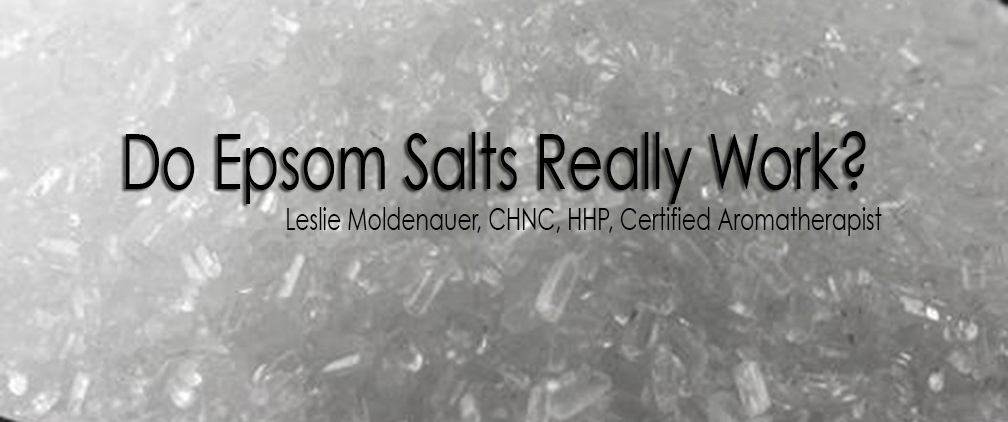There are times where we all fall suspect to confirmation bias when it comes to what we are told in regards to natural remedies. We may know that there are indeed specific benefits to a remedy, we may have even experienced a few of them firsthand, but those benefits can oftentimes be extrapolated beyond what is scientifically shown. Do Epsom salts really work?
I personally know through experience, that there are benefits for me, I will explain more in a little bit, but the detoxifying claim always left me scratching my head….so I decided to do a little digging about all of the claims on my own.
Epsom salt is magnesium sulphate heptahydrate, usually shortened just to magnesium sulphate. We know magnesium is a mineral with many benefits to the human body. A study performed in 2005 with The Journal of the American College of Nutrition showed that nearly 70% of Americans consume less than the daily RDA of magnesium, and showed that this deficiency is a marker for increased inflammation [1].
What is the importance of this mineral in the human body?
The following is according to the reputable site, MedLine Plus:
“Magnesium is needed for more than 300 biochemical reactions in the body. It helps to maintain normal nerve and muscle function, supports a healthy immune system, keeps the heart beat steady, and helps bones remain strong. It also helps regulate blood glucose levels and aid in the production of energy and protein” [2].
What are some symptoms of a magnesium deficiency in the body? Magnesium deficiency, also known as hypomagnesemia, is not something that is talked about very often. We typically hear more about being deficient in vitamins B, C, and D before we hear about magnesium. This is not due to lack of importance.
Muscle twitches and cramps
Low levels of magnesium, as well as calcium and potassium, can cause muscle twitches and cramps, and when severe enough this can be termed tetany [3] [4].
Those of us that are physically active and wake in the middle of the night with a charlie horse knows that our body is telling us something. It is telling us that we are dehydrated, but it is not only water that we need but minerals, electrolytes.
*It is important to note that magnesium deficiency is not the only cause of muscle twitching.
Fatigue and muscle weakness
Fatigue and muscle weakness can potentially describe all of us sometimes, like when outdoors in the heat…or well, just being a mom sometimes, am I right? So it is important to note that the fatigue and muscle weakness we are talking about here is severe and unrelenting, lasting more than a day or two.
The reason for the extreme fatigue and weakness is believed to actually be from a lack of potassium in the cells, which coincides with low magnesium levels [5].
*If your symptoms are severe, please be sure to see a doctor.
Blood pressure
This study published in 2016, showed that a deficiency in magnesium can contribute to higher blood pressure, and obtaining the RDA can help to lower it [6].
For this reason, we might want to utilize caution in a bath full of Epsom salt if we already have low blood pressure, which I do..on average my bp is 105/75. If I add too much salt to the water and soak for too long in too warm of water, I get lightheaded, dizzy, and have even had episodes of irregular heartbeats. Due to the temperature of the water or the salts? Both? What do you think?
Irregular heartbeat
Scientists believe that irregular heartbeats are actually due to an imbalance of potassium levels inside and outside of heart muscle cells, a condition associated with, you guessed it..a deficiency in magnesium [7].
What have you noticed in all of the symptoms that I have just described above? (not an all-inclusive list of magnesium deficiency) Magnesium does not act alone. It is very much a balance of magnesium, potassium, and calcium that we should aim for. Getting one more than another may not be the answer, it could only serve to further throw off the delicate balance of minerals in the body. Good health is all about balance.
Relaxation
The main push for magnesium in a bath is for relaxation. How does magnesium relax us? We are again reminded of balance. Calcium and magnesium work harmoniously together. Internally, calcium excites our nerves, promoting muscle contractions. Magnesium does the opposite by calming nerves and promotes our muscles to relax [8].
Many people question how much magnesium we are absorbing to actually help with sore muscles or even relaxation. How much of it is placebo? Is it just the warm water? The essential oils? The power of the mind? What have you experienced?
I am not at all against Epsom salt baths, I am actually a fan! Whether placebo of scientific fact, I have experienced benefits, so for today I am going with that!
Can Epsom salts really detoxify us?
Detox has become quite the buzzword online and on social media. There is so much misinformation, it is important to look at things with a critical eye. You can very easily find claims online that Epsom salts can pull out toxins from the body, but how would this claim work?
Outside of magnesium providing a laxative effect if consumed internally or even possibly soaking too long with too many salts, this is a very far-fetched claim with no scientific evidence to back it up. Websites state that your body absorbs the minerals through the skin, and the minerals then draw out toxins. For those of you who have taken anatomy and physiology know that this is somewhat improbable. What toxins are being drawn out, and how?
In regards to our integumentary system, not everything we put on our skin is fully absorbed into our bodies. If this were the case, we would swell up while soaking in the bathtub, and swimming in a pool full of chlorine would…well…let’s just say it would not end well. Our skin is somewhat waterproof for a lack of a better term.
A phenomenon to also consider, looking at the flip side, is when we sit in the bathtub for an extended period of time, we get quite the wrinkled look on our fingers and toes. The keratin is actually absorbing the water, but only for a short time [9]. This is also why your nails will bend easily after getting out of the bath, after a good foot soak (best time to clip em’) or after doing the dishes as your nails contain considerable amounts keratin [9].
Because of this, I think it is fair to say that we do absorb a very small amount of magnesium, which is why I can have such a strong reaction to my blood pressure if I am not careful. I have experienced the laxative effect that is touted on the bag as well just by soaking in the tub with way too much for too long on one occasion when I had really bad back spasms (The bag of Epsom salts recommends taking internally for a laxative effect).
Unless we are forcing the body to sweat excessively like in a steam or sauna, are we really detoxing in the bathtub?
*The following article tackles this concept in great detail. Rather than recreate the wheel, I ask you to read it if you still think Epsom salts can provide the body with detoxification. It is a fantastic read: Does Epsom Salt Work?
Supporting our detoxification process backed by science
We know that there are numerous ways in which our body eliminates waste. They are urine, feces, lungs, skin, and very minimally via our hair. Therefore, there are numerous ways that we do know support our body to rid it of unwanted chemicals and materials. Drinking more water is the number one thing that you can do, as it increases kidney function by increasing your output of urine. It also helps you to poop more regularly, encouraging colon health. Sweating via exercise, steam baths, and saunas as I mentioned above are also very beneficial if you can handle the heat (not the same as a bath). Exercise also helps open the lungs to facilitate deeper breathing, helping detoxification of the air we breathe.
Closing
I believe that Epsom salt baths are relaxing, and we all deserve to treat ourselves to some quality self-care, often! It is important to understand that there is simply no scientific evidence showing that there is any kind of true detoxification happening when you soak in the tub.
A very important point to remember is that the overuse of magnesium via supplements could throw off your balance of other critical minerals. Education and awareness are key, with a whole lot of balance.
Like so many practices in life I encourage you to become educated on the proper use of essential oils. When using them, please do so cautiously, understanding that there is often misinformation on the Internet. You can be assured that I support only educated and proven resources. While essential oils should not be feared they should be respected and used properly to ensure the safety of the individuals using them. Please note that I am not a medical practitioner. The content of the website is provided for general informational purposes only and is not intended as, nor should is be considered a substitute for, professional medical advice. Do not use the information on this website for diagnosing or treating any medical health condition. If you have, or suspect you have a medical problem, promptly contact your professional healthcare provider. By using this website, you assume full responsibility and liability for your own actions.

References
[1] King DE, et al (2005) Dietary magnesium and C-reactive protein levels. The Journal of the American College of Nutrition. Retrieved from https://www.ncbi.nlm.nih.gov/pubmed/15930481
[2] Magnesium in diet. Retrieved from https://medlineplus.gov/ency/article/002423.htm
[3] Vallee, B. et al (1960) The magnesium-deficiency tetany syndrome in man. The New England Journal of Medicine. Retrieved from https://www.nejm.org/doi/full/10.1056/NEJM196001282620401
[4] Han, S. (2017) What is Tetany? Retrieved from https://www.healthline.com/health/tetany
[5] Huang, CL, Hou, E. (2007) Mechanisms of hypokalemia in magnesium deficiency. Journal of American Soc Nephrol. Retrieved from https://www.ncbi.nlm.nih.gov/pubmed/17804670
[6] [7] Dyckner, T., Wester PO., (1981) Relation between potassium, magnesium, and cardiac arrhythmias. Acta Med Scand Suppl. Retrieved from https://www.ncbi.nlm.nih.gov/pubmed/6942639
[8] Standring, S. (2016). Grays anatomy: The anatomical basis of clinical practice. Philadelphia: Elsevier Limited.
[9] Why do fingers wrinkle in the bath. Retrieved from https://www.scientificamerican.com/article/why-do-fingers-wrinkle-in/
Additional Resources
No, You Can’t ‘Detox’ from an Epsom Salt Bath
The Calming Effects of Calcium and Magnesium
BEFORE YOU GO! Remember to sign up for my FREE Facebook group! Hang out with me and THOUSANDS of other Essential Oil lovers looking to learn, click on to join Real Essential Oil Education Group!
Check out my FREE offer below!




